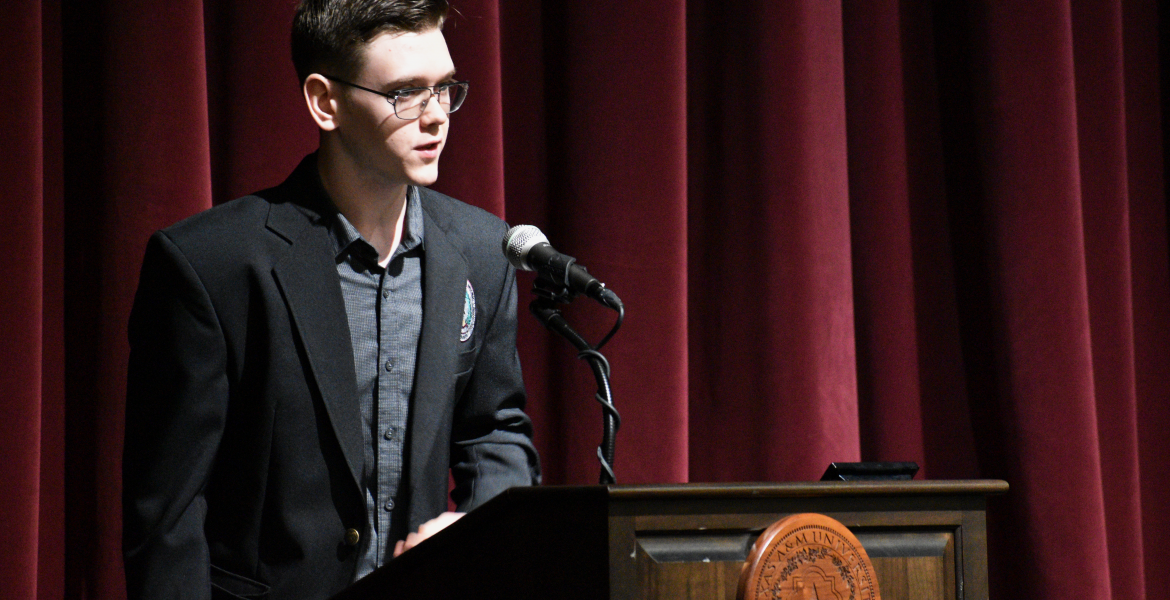For Jacob Goldstein, computer information systems junior, 2022-23 will mark his second term as president of the Student Government Association at Texas A&M University-San Antonio.
He began at a time when remote learning was still the norm and the delta variant made its course through the country.
As such, he said engagement was not the best with mostly everyone at home. Also, SGA was composed of only six members at the time, which limited the avenues students had to provide feedback.
Now, after winning re-election in April, the number of representatives has increased to about 25.
“And obviously, we don’t want to stop there,” Goldstein said in a May 19 interview. “We want to keep the momentum going, foster additional growth, obviously. I’ve worked with the senate to make sure more positions open for students to be representatives.
“I know there was a big struggle last year — we would have one person to represent the entire freshman class, one person to represent every single class, and obviously it’s very difficult to be that sole representative for just a single class in our senate,” he said.
There are now three senators per class, including graduate students.
By his side stands accounting senior Kirstan Garcia, who used to be the speaker of the senate for SGA. Now, as vice president, the responsibility of the position is not lost on her. She now has a bigger hands-on approach, she said.
“The big thing I’m looking forward to, with that responsibility, is the fact that I get to aid everyone in the organization to pass legislation,” Garcia said in a May 19 interview.
The two of them were sworn in on May 6. Goldstein won the presidential election against Iris Castillo, former SGA vice president. The final vote count was 245, with 134 votes going to Goldstein and 106 to Castillo. Five abstained from voting.
Garcia ran unchallenged, receiving 227 votes. Eighteen abstained from voting.
Garcia said she believes the biggest challenge students face is finding proper guidance in a university setting, having to understand how to vocalize concerns.
This means sometimes SGA hears about student concerns via other channels that are not the students themselves, Garcia said, and she wants to change that.
“I want to start being creative and showing the students that we’re an organization they can trust to make a difference on campus,” Garcia said.
On a similar note, Goldstein said he wants this university to feel like more than a come-and-go experience for students. He said he wants it to be a place that foments student life, pride and engagement.
As for the Mays Center, he said SGA could work with the center to create more volunteering opportunities for students while maintaining and strengthening relationships to increase collaboration.
“We want to help our students make sure that they can feel welcome on campus,” he said. “They can make friends; they can do all these different things and engage outside of the classroom.”
He said he wishes to strengthen relationships with student organizations by promoting their events, attending meetings and coordinating with representatives.
These organizations and their respective events can be browsed on the student platform, JagSync.
However, student life doesn’t stop at student organizations and events. Housing is embedded into student life. With an overwhelmed Esperanza Hall and student residents occupying local hotels, Goldstein and Garcia aim to make housing a priority during their 2022-23 term.
“This is the main issue for this academic year,” Garcia said. “It’s going to have to be priority number one going into any meeting with our university figures such as Dr. (Cynthia Teniente) Matzen and Dr. Z (Zeak Naifeh, associate vice president and dean of students), anybody.
“We have all these incoming freshmen who want to be engaged, who want to do so much on campus, and how are they going to do that? By making sure that they go into their bed at the end of the day, that they’re happy with where they rest their head,” she added.
That comfort also includes a sense of belonging. Garcia said promoting safe spaces, particularly for minority groups — which include “Dreamers” — is key.
SGA is subject to IndocuAlly workshops, which train campus organizations to become more familiar with the status of student immigrants as well as ways to support and understand them.
Garcia said she plans to continue this training for SGA members.
“That way we know what to do, how to talk about it, how to listen to ‘Dreamers,’” she added.
This will ensure that “SGA is a safe space for ‘Dreamers.’”
Improving students’ experiences on campus extends to parking, and Goldstein said he plans to work on a new appeal system for parking tickets in the new academic year.
“Something that I would like to work on this year is to work on a parking council that incorporates hearing appeals, whether it’s in person or virtual,” he said.
Ideally, Goldstein said he envisions a team of students and staff forming a parking council that can streamline the appeal process. Currently, he said only one university employee takes care of appeals, which are handled remotely via email.
Ultimately, Goldstein and Garcia said they esteem student engagement with SGA, believing it can bring about changes crucial for an institution as young as A&M-San Antonio.
“Right now, you have the most impact in your own thoughts, your feedback because we still have the opportunity to make these changes,” he said, referring to students. “I would certainly advise that if there’s any issues, directly that you are passionate about, that you make those issues known because certain actions can always be taken to try to make sure that you have the most enjoyable college experience that you can.
“At the end of the day, that’s what SGA is here to do,” Goldstein added.






